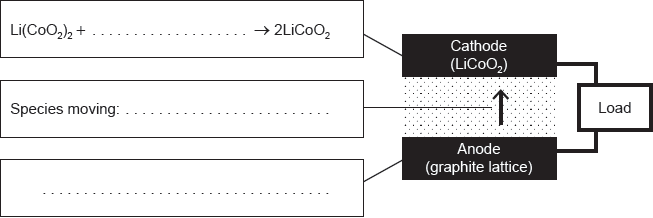| Date | May 2017 | Marks available | 1 | Reference code | 17M.3.hl.TZ1.22 |
| Level | HL | Paper | 3 | Time zone | TZ1 |
| Command term | Suggest | Question number | 22 | Adapted from | N/A |
Question
As well as being burnt, methanol can also be used to provide electricity through a fuel cell. A schematic diagram of such a fuel cell, that depends on the transfer of hydrogen ions between the electrodes, is shown below.
Even though fuel cells, primary cells and rechargeable cells have similar fundamental characteristics, there are important differences between them.
Deduce half-equations for the reactions at the two electrodes and hence the equation for the overall reaction.
Suggest a way in which they are similar.
Outline the difference between primary and rechargeable cells.
Identify one factor that affects the voltage of a cell and a different factor that affects the current it can deliver.
Markscheme
Anode: CH3OH(aq) + H2O(l) → CO2(aq) + 6H+(aq) + 6e–
Cathode: O2(aq) + 4H+(aq) + 4e– → 2H2O(l)
Overall: 2CH3OH(aq) + 3O2(g) → 2CO2(aq) + 4H2O(l)
Accept correctly balanced equations with multiples of the coefficients given here.
Accept reversible or non-reversible arrows for all.
[3 marks]
«portable» sources of electrical energy/electricity
OR
convert chemical «potential» energy to electrical energy/electricity
[1 mark]
primary cells involve irreversible reactions AND rechargeable cells involve reversible reactions
Accept “primary cells have a limited life before going ‘flat’ AND rechargeable cells can be recharged when ‘flat’”.
[1 mark]
Voltage:
chemical nature of electrodes
OR
electrode reactions
Current:
diffusion rate
OR
internal resistance/resistance of the cell
Accept temperature for either but not both.
Accept concentration for either but not both.
Accept pH for either but not both.
Accept the current depends on the area/separation of the electrodes.
[2 marks]



